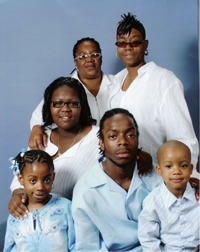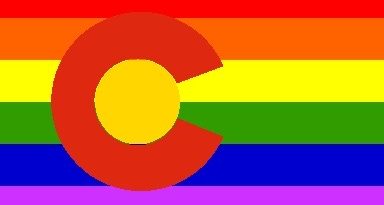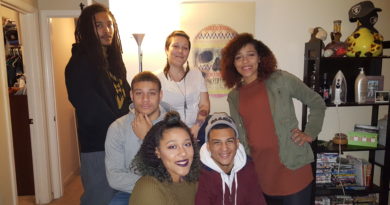Challenges for LGBT parents of color: Oppression because of one’s gender and race can be overcome.
When the doorbell rings, Cale Fuoco runs to answer at his family home in Northern Seattle. The 7-year-old holds a small wooden board in his arms – a 2×4 with two eyes and a lopsided smile, which have been etched in marker on one side of the board.
“Meet my friend, named Plank” Cale says.
At the dinner table, Plank has a seat and place setting all to himself. After Cale retreats for a little math homework and some secret TV watching, Plank is abandoned at the table to Cale’s dads, Frank Fuoco and Benjamin Liu.
Gesturing toward Plank, Frank shakes his head as he points out the obvious: “Cale needs a sibling.”
It’s a simple statement, and yet for same-sex couples like Frank, 40, and Benjamin, 38, adding children to the family is never – and could never – be taken lightly. In debates about the long-term effects of lesbian, gay, bisexual and transgender (LGBT) parenting on the well-being of children, few critics rarely acknowledge the uncomplicated truth: parenting in a same-sex relationship is a choice made with incredible intention.
On the road to parenthood, LGBT parents-to-be face a long line of barriers – invasive questions and decisions by local, state and federal governments on an individual’s “ability” to become a parent; financial costs escalating into tens of thousands of dollars; emotional drain; and frustration when, time and again, an insemination attempt is unsuccessful or an adoption falls through at the last moment. And these barriers are just the beginning of the process, affecting a couple at the primary level and deciding at the outset whether or not a child is even “able” to come into their home – a right that is automatically granted to heterosexual couples on the basis of biologic proclivity.

For LGBT parents of color, the obstacles grow into a more intangible list that includes the fear of becoming involved in state systems; oppression brought on by the intersection of one’s gender and racial identity, and in no small part, by the need to find an ethnic community that not only accepts, but celebrates, LGBT homes. Despite cultural, emotional, physical and financial barriers, same-sex couples of color are twice as likely to be raising children than white same-sex couples, according to 2000 Census data from the Williams Project on Sexual Orientation Law and Public Policy at UCLA’s School of Law.
That statistic does more than speak to the resiliency of the family model in same-sex households of color – it speaks to their overarching desire to become parents. According to a 2006 report from University of California at Davis on legal recognition of same-sex relationships in the United States, roughly 40 percent to 70 percent of gay men and 45 percent to 80 percent of lesbians are in long-term or marriage-like partnerships. Of couples who are cohabitating, 34 percent of female couples and 22 percent of male couples have children under 18 living at home.
The numbers boil down to this: Cultural and technological changes during the 20th century have fostered a greater diversity of family forms in the United States. Though LGBT couples are denied equal marriage rights in all but one state (Massachusetts), same-sex couples in committed partnerships have, and will continue to, “set up shop” in much the same way as married and/or cohabitating opposite-sex couples.
And yet, LGBT foes like Focus on the Family are quick to ignore the longevity and success of these relationships and, instead, accuse lesbian and gay parents of poor parenting practices. In a 2004 statement, the group asserted that children of same-sex couples “suffer abuse, perform poorly in school, abuse drugs and wind up in trouble with the law” simply because of the sexual orientation of their parents. In reality, there are very few studies that prove how children of same and opposite-sex couples differ. An article published in 2001 in the American Sociological Review compares children raised by LGBT parents and by heterosexual parents, and finds no disparities in their mental health or social adjustment.
While debates about the merits of gay parenting rage on, LGBT parents and their children are, in their private lives, making families work. Statistics notwithstanding, one fact can be recognized: Families who are intentional about their parenting practices, whether gay or straight, share similar experiences as they learn to parent effectively.
Reprinted with permission: Meg Krugel, ColorsNW Magazine
Bottom photo: Family Equality Council Gallery



It’s a long article, but it’s worth the read. As a woman of color, I appreciate the insight.
Namaste
Enjoy it while it lasts, because it won’t for long. Nature will prevail and all of your destructive attempts to normalize sexual deviancy will be for naught. Your attempts to censor free speech in the guise of hate speech is reprehensible and also rather fruitless. Aren’t you humiliated that the only way you folks seem to be able to get along in life is through legislative coercion and constant mewling and whining?